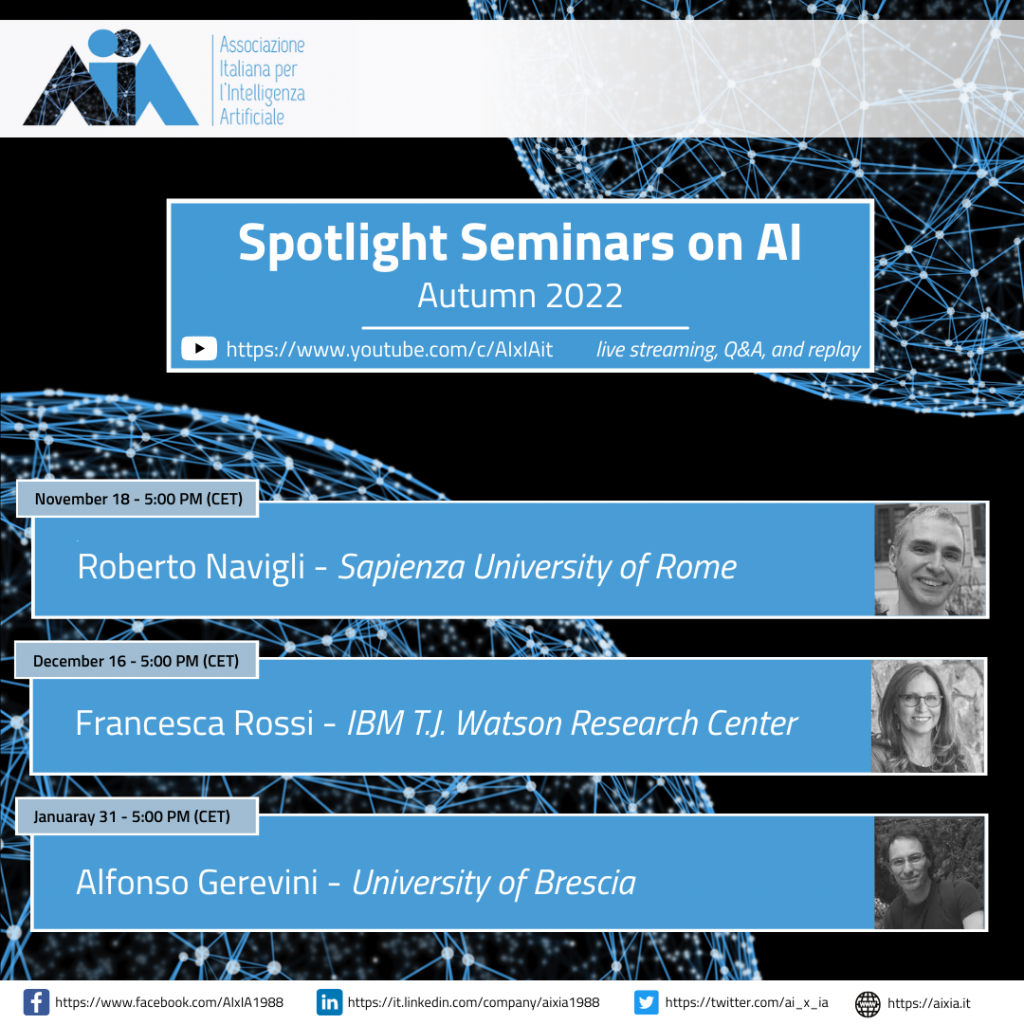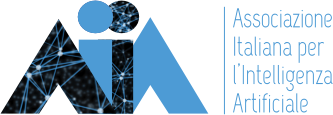Spotlight Seminars on AI – Autumn 2022
The I talian Association for Artificial Intelligence is pleased to announce the Autumn 2022 program of the Spotlight Seminars on A. The aim of the seminars is to illustrate, explore and discuss current scientific challenges, trends, and possibilities in all branches of our articulated research field. The seminars will be held virtually (https://www.youtube.com/c/AIxIAit), on a monthly basis, by leading Italian researchers as well as by top international scientists. The seminars are mainly aimed at a broad audience interested in AI research, and they are also included in the Italian PhD programme in Artificial Intelligence; indeed, AIxIA warmly encourages the attendance of young scientists and PhD students.
talian Association for Artificial Intelligence is pleased to announce the Autumn 2022 program of the Spotlight Seminars on A. The aim of the seminars is to illustrate, explore and discuss current scientific challenges, trends, and possibilities in all branches of our articulated research field. The seminars will be held virtually (https://www.youtube.com/c/AIxIAit), on a monthly basis, by leading Italian researchers as well as by top international scientists. The seminars are mainly aimed at a broad audience interested in AI research, and they are also included in the Italian PhD programme in Artificial Intelligence; indeed, AIxIA warmly encourages the attendance of young scientists and PhD students.
The “Autumn 2022” edition features 3 seminars:
- Roberto Navigli, Sapienza University of Rome
- November, 18 – 5:00PM (CET)
- Title:Neuro-Symbolic Multilingual Natural Language Understanding
- Abstract: Natural Language Processing (NLP) has seen an explosion of interest in recent years, with many industrial applications relying on key scientific and technological developments in the field. However, Natural Language Understanding (NLU) – which requires the machine to get beyond processing strings and involves a semantic level – is particularly challenging due to the pervasive ambiguity of language. In this talk I foster a vision focused on the mutually synergistic interaction between multilingual explicit and latent representation and processing of meaning at word and sentence level, and I will discuss the recent developments and challenges of three key tasks in NLU, namely Word Sense Disambiguation, Semantic Role Labeling and Semantic Parsing.
- Bio: Roberto Navigli is Professor of Computer Science at the Sapienza University of Rome, where he leads the Sapienza NLP Group. He is one of the few researchers to have received two prestigious ERC grants in AI on multilingual word sense disambiguation (2011-2016) and multilingual language- and syntax-independent open-text unified representations (2017-2022). In 2015 he received the META prize for groundbreaking work in overcoming language barriers with BabelNet, a project also highlighted in The Guardian and Time magazine, and winner of the Artificial Intelligence Journal prominent paper award 2017. He is the co-founder of Babelscape, a successful company which enables Natural Language Understanding in dozens of languages. He served as Associate Editor of the Artificial Intelligence Journal (2013-2020) and Program Chair of ACL-IJCNLP 2021.
- Francesca Rossi, IBM T.J. Watson Research Center
- December, 16 – 5:00PM (CET)
- Title: Thinking fast and slow in AI: a cognitive architecture for both autonomous and hybrid human-AI systems
- Abstract: Current AI systems lack several important human capabilities, such as adaptability, generalizability, self-control, consistency, common sense, and causal reasoning. We believe that existing cognitive theories of human decision making, such as the thinking fast and slow theory, can provide insights on how to advance AI systems towards some of these capabilities. In this talk I will present a general architecture that is based on fast/slow solvers and a metacognitive component, showing experimental results on the behavior of an instance of this architecture, for AI systems that make decisions about navigating in a constrained environment. They show how combining the fast and slow decision modalities allows the system to evolve over time and gradually pass from slow to fast thinking with enough experience, and that this greatly helps in decision quality, resource consumption, and efficiency. I will also describe how this architecture can be used to support human decision making.
- Bio: Francesca Rossi is an IBM Fellow and the IBM AI Ethics Global Leader. She is based at the T.J. Watson IBM Research Lab, New York, USA, where she leads AI research projects. Her research interests focus on artificial intelligence, with special focus on constraint reasoning, preferences, multi-agent systems, computational social choice, neuro-symbolic AI, cognitive architectures, and value alignment. She co-chairs the IBM AI Ethics board and she participates in many global multi-stakeholder initiatives on AI ethics, such as the Partnership on AI, the World Economic Forum, the United Nations ITU AI for Good Summit, and the Global Partnership on AI. She is a fellow of both AAAI and of EurAI, she has been president of IJCAI and the Editor in Chief of the Journal of AI Research. Currently she is the president of Association for the Advancement of Artificial Intelligence (AAAI).
- Alfonso Gerevini, University of Brescia
- January 31 – 5:00PM (CET)
- Title: On Modeling and Learning Domain Knowledge in AI Planning
- Abstract: AI planning requires a model of the domain actions and of the possible domain states. Given an initial state and a goal, a classical planning system uses the domain model to automatically generate, through search, a sequence of executable actions reaching the goal from the initial state. While current techniques for classical planning are very effective, this approach has several limits, including issues related to the domain modeling. First, it can be hard or impossible to express knowledge that is not limited to single actions or single states.This can be important to characterize the desired solution plans, and is useful to provide control knowledge to the planning search in a declarative manner. Secondly, the available knowledge for modeling the domain actions and states might be inadequate, incorrect, or difficult to specify for a human.
Two research avenues for addressing these issues are: (a) Extending the simple action/state model of classical planning with additional knowledge over sequences of actions/states specified by temporal logics (e.g., PDDL3, LTL, PPLTL) that can be automatically encoded into an equivalent revised classical domain model; (b) Exploiting machine learning to automatically acquire the domain model from data/experience, learn search heuristics, or even generate planning solutions without using any action model. In this talk, I will present some recent results in these directions. - Bio: Alfonso Emilio Gerevini is Professor of Computer Science at the University of Brescia, where he leads the research group of AI Planning and Machine Learning. Previously he was a researcher at IRST-FBK, University of Rochester, and University of Freiburg. His research focuses on automated planning, temporal reasoning, KR, machine learning, and, more recently, also on neuro-symbolic AI, applied NLP, AI in healthcare and industry. During his 30 years of research in AI planning, he proposed many algorithms, heuristics, languages, compilers, and architectures for several approaches to planning. With his research team he developed many planning systems, five of which awarded by ICAPS – the main conference on Automated Planning. In 2019 he also received an influential-paper award from ICAPS for a paper on planning through stochastic local search and graphs. He served the AI community in various ways, including as an editor of the Artificial Intelligence Journal. He is a fellow of EurAI and AAIA.
Spotlight Seminars Scientific Committee: Giuseppe De Giacomo, Chiara Ghidini, Gianluigi Greco, Marco Maratea
Live streaming, Q&A, and replay at: https://www.youtube.com/c/AIxIAit
